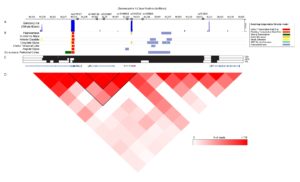Rapid automatized naming (RAN) and rapid alternating stimulus (RAS) are measures that involve naming familiar items quickly and accurately. They are also reliable predictors of dyslexia. The high correlations between RAN, RAS, and reading could be due to genetic factors that they share in common, and that modify an underlying biological mechanism. We describe genetic variants encoded on chromosome 10 that correlate with RAN, RAS, reading, and volume of a reading center in the brain. The location of these variants on the chromosome suggest they could be informative markers for genetic factors that modify the instructions for turning on and off a gene called renelase, which has not been previously linked to reading. (By Dr. Jeffrey R. Gruen, https://jmg.bmj.com/content/early/2019/04/17/jmedgenet-2018-105874 )
Multivariate genome-wide association study of rapid automatized naming and rapid alternating stimulus in Hispanic American and African American youth
(Visited 113 times, 1 visits today)
